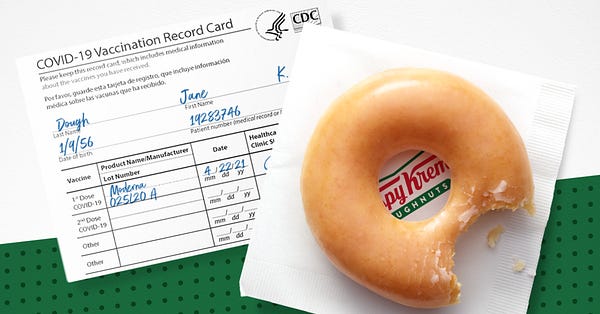Krispy Kreme vs. State Failure
So It Turns Out, #25
Hi,
So here are some things I’ve been thinking about this week.
The sources of state capacity failure:
The weirdest part of this whole pandemic has been realizing that the vaccine rollout depends on information technology that the highest priority groups often cannot use, and that public officials often do not understand.
DC’s vaccine site (previously), in addition to its many basic flaws about being able to Be A Working Website In the Year 2021, also did not have a Spanish-language translation until recently.1 The charts about eligibility tiers were not translated, either — so if you’re an elderly Spanish speaker desperate to hug your grandkids again, Mayor Bowser wants you to fire up that Duolingo, I guess.
Now, to be clear, there are definitely older folks who adapt to technology beautifully, and right this very moment I can point you to Facebook groups where retirees are helping each other navigate the vaccine process, with a degree of reverse-engineering the process that would do most social engineering experts proud. But it’s also a tax on users, expecting them to navigate broken and complex processes to get help.
And, as far as I can tell, politicians genuinely don’t know, or don’t care. Perhaps it’s because these processes are designed, basically, to specifications written by lawyers, implemented by people who specialize in Professional Bureaucracy, and evaluated under their collective rubrics for user experience:




(I strongly feel these remarks, currently being connected at a volunteer level with the effort that Patio11 is leading at VaccinateCA2 — this is more true for desperate people on the ground level than you can imagine. We try to make it easier for those folks every day, and we’re still not good enough. But we’re trying.)
So: bureaucracy and law — traditionally forces to strengthen the state’s capacity — are here, factors that greatly diminish its ability to get vaccines out at the scale needed. But why?
***
Somewhere along the way, bureaucracy became a skill, not just a necessary requirement. We praised people for gaining skill in it, and built systems that assumed it, and rewarded higher levels of it. And if you don’t have it, that’s your own fault.
Here’s an illustrative digression, perhaps. (I originally was going to write this about the rise of policy masters’ degrees in America and their relative focuses, but I still need to track down the Exxon Education Foundation report from the 1970s before I can write that piece. So I’m going personal, instead).
I went to an all-boys’ school in suburban Cleveland for middle and high school. The school was founded by, no kidding, literal Gilded Age Titans of Industry to ensure that their children learned the industrial arts to become good inheritors of their fortunes3— the statue I walked past in the front door every day was of a student literally striking hammer and anvil together to make tools. Yet by the time I attended, in the late ‘90s and early ‘00s, the school had become Just Another Advanced Placement Factory4 — and by far, the majority of students in my graduating class ended up in law, finance, or medicine. The metalshop was scrapped, the woodshop was barely used, and the science classes were really for pre-med purposes.
And I don’t blame my school for that! If you wanted to sustain and scale a fortune in Cleveland over the 20th century, law, finance, or medicine were far better bets than industry, sadly. And 2 of the 3 of those professions are really about managing institutions’ resources and risks (perhaps good skills for an heir), and the 3rd built the two largest employers left in Cleveland after the mills closed.
But learning those things doesn’t prepare you to build technology that has to be used by, basically, every American. They probably teach you the opposite.
***
Asking “why can’t the government build a website anymore,” is probably a hilariously overdetermined question. But if a government can’t get it done under wartime conditions and pressures, how would we expect it to meet our needs outside the pandemic? And if our institutions don’t value teaching leaders that, who will?
All I am asking for is the competency of Krispy Kreme for the vaccine rollout process:
This week, a world-class logistics organization entered the vaccination fight.
Obviously, free donuts won’t be the solution to resolving vaccine hesitancy on their own. But I’ll still take the free donuts. (The official Krispy Kreme of this newsletter is the Birthday Cake donut).
Perhaps an answer to the website question?
(I lost it at “…has omniscient knowledge of all current user info providers, it doesn’t have future sight, or knowledge of past user info providers, so it expects a time stamp. So we need to pass a time range containing the current date and the expected end of the universe.” If you know, you know.)
Generalized vaccine-hunting advice:
In my last newsletter, I promised to turn from DC-specific advice to more general advice. If you get this newsletter, and you need help navigating this process for yourself or an eligible loved one, PLEASE email or text me and I will help as much as I can.
Here is my current best guess at a generalized, location-agnostic COVID vaccine hunting strategy, as of 21 March 2021. (Answer guaranteed to be inaccurate no later than 30 April 2021, and expected to be likely inaccurate no later than 15 April 2021).
1. Really read the rules hard to see if you’re eligible, for the state you live in, as well as the state (if different) that you work in. Remember that, generally, the conditions are not just "have now," but "ever had" -- relevant, for, say, smoking or cancer. Also check your BMI, unless knowing that answer is hazardous to your mental health and peace. Remember that BMI was invented in the 1830s, is famously counterintuitive for especially tall/short men and basically all women. (~40% of Americans have a BMI over 30, which qualifies you in many states)
2. Spend literally 5 minutes googling the following sentences:
a. "[Name of state] vaccination locations"
b. "Pharmacies distributing covid vaccine in [name of state]"...
and note who has the vaccine. (It's probably more locations and chains than you think). Or, if you want to go more fancy, vaccinespotter.org is the new hotness for the major chains — but likely misses sources like hospitals, HMOs, the VA, independent pharmacies, etc.)
3. Make a list of pharmacies from those chains nearby, call those pharmacies, trust only information from the pharmacist, continue moving down list until you have a confirmed appointment, go to that appointment.*
4. If hitting roadblocks, go to https://www.vaccinehunter.org/ , join the group for your region on Facebook, and get help.
5. Then turn around and help your family and friends. Every day a dose gets faster into an arm is a victory.
(*#3 stolen verbatim from Patrick McKenzie)
We can’t all get vaccines yet. But right now, in NYC, CA, etc., there are known to be thousands of doses sitting on shelves each day because appointments go unfilled. If you are eligible, go NOW. You’re not stealing a vaccine from an elderly 99-year-old widow, you’re protecting her by taking a vaccine no one else is using that you’re allowed to take, and making it harder for the virus to spread.
Meanwhile, I’ll continue to volunteer at VaccinateCA.com, the only volunteering opportunity that allows me to write things like “HAVE YOU EVER TRIED SEEING LIKE A STATE? It’s really hard” in the staff Discord.
The book to read if you like Matt Levine’s columns:
If you read this newsletter, odds are good that I’ve convinced you to subscribe to Matt Levine’s column, Money Stuff. (If I haven’t, stop reading this and go subscribe — it’s free). If you love Levine’s hilarious and thoughtfully digressive discussions of frauds and crimes, then Dan Davies’ Lying for Money is your book of the year. I devoured it in two sittings, and immediately promoted it to the “books I keep on hand to give away to visitors”5 shelf.
The official aesthetic policy of this newsletter:
The official baseball heresy5 of this newsletter:
May these birds bless your timeline:
May this possum inspire shanty authorship:
May this rabbit bring you peace:
Disclosures:
Views are my own and do not represent those of current or former clients, employers, friends, or my cat.
I may on occasion use Amazon Affiliate or similar links when referencing things I’d tell you about anyways. As an Amazon Associate I earn from qualifying purchases; I donate the proceeds to charity. While Substack has a paid subscription option, I don’t have any plans to use it at this time and anyone who gets this newsletter now surely won’t be ever paying for their subscription.
See this heroic, but probably futile, PDF attempting to advise Spanish-language users on what buttons to push by putting labels on screenshots of the English-language-only site. I appreciate the desperate effort from a civil servant that was stuck inside a broken system — sincerely! — but it’s a sign of how broken things are.
Again, as a reminder, comments my own and not on behalf of VaccinateCA.
Specifically, they didn’t want to send their kids to boarding schools where they’d have a classical curriculum without technology and science.
Where Greek and Latin were now taught.













